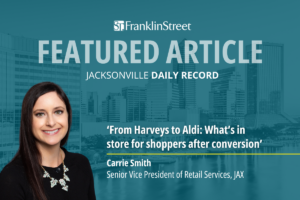The commercial real estate market in Jacksonville saw marked improvements in 2016 as rents inched up and vacancy decreased in every major sector.
However, no single sector dominated the headlines last year.
The industrial developers started speculative development for the first time since the great recession and the emergence of Amazon generated buzz about Jacksonville’s potential.
The retail sector saw the first large-scale development since the opening of the St. Johns Town Center and the River City Marketplace.
If there was one sector that lagged behind the others it would be office.The office sector saw Downtown vacancy dip, but several tenants also planned moves to the suburbs, including 170,000 square feet in the Southbank Tower where Aetna had taken space for years.
Even in a year where the other sectors of commercial real estate had more positive news, Jacksonville’s office sector proved promising.
Jacksonville veteran John Carey started work on two large-scale developments that could see the first speculative office building development in about a decade.
The upcoming year in commercial real estate promises to be just as interesting as 2016.
Retail
One of the biggest stories of 2017 will be the impact that retail development has on the market. With the new developments of hundreds of thousands of square feet (The Strand and The Crossing, Town Center Promenade and Ikea) all going in around the St. Johns Town Center, an interesting storyline to follow will be how existing tenants, landlords and customers react.
Carrie Smith, regional managing partner with Franklin Street, said it’s something that retail brokers will have to monitor closely.
“We are going to have quite a bit of product hit the market at the same time,” said Smith, who arrived in Jacksonville right as River City Market Place opened. “It’s unlike anything I have seen since I’ve been in Jacksonville.”
Smith said she doesn’t expect the impact to be negative on the other retail markets of Jacksonville, but there is questions about what the additional shop space will do to traffic in an already congested area.
Smith said boutique retail is thriving as shoppers look for shopping experience. She expects even more expansion of this type of retail.
“From independent clothing shops to specialized fitness retailers, we’re going to see a lot more personalized shopping and service businesses in our neighborhoods,” Smith said.
Something that’s been a few years in the works, she said, will finally become a reality as omni-channel” retailers (retailers that use several different forms of media to connect to customers) will “lead the pack.”
“It’s undeniable now, that as a retailer you have to have a model that connects costumers from a variety of different channels, that luckily for us in commercial real estate, does include having a storefront,” she said.
Office
The office sector of commercial real estate had a difficult year, especially in the second half as rental-rate increases ground to a halt.
“This is due to demand slowing down,” said CBRE senior vice president Oliver Barakat. “It is also due to phantom space that continues to be put on the market.”
Phantom office space refers to a block of space that is currently occupied but possibly under utilized and on the market. While this space is not counted in the vacancy rate, it is effectively on the market and competes with other vacant space for office users.
“We continue to see companies consolidate into smaller footprint regardless of whether or not they are growing their employee base,” Barakat said. “Leases that were signed seven to 10 years ago and are rolling over will continue to potentially put more space on the market.”
Barakat believes despite the densification of office space as employers use it more efficiently, that overall job growth in Jacksonville will cause vacancy rate decreases in 2017, albeit not as quickly as they could have decreased.
Barakat says this slower decrease in vacancy rate will likely cause slow gains in the rental rates, which could make it difficult for any planned office development.
Industrial
The biggest story in the industrial sector was the announcement that Amazon would build a facility in Jacksonville near the Jacksonville International Airport.
“Having a company like Amazon choosing Northeast Florida, is a great shot in the arm for our industrial market,” said President of Newmark Grubb Phoenix Realty Group J.R. Richardson. “I think it helps give notoriety for our area the services that we can provide.”
However, if it hadn’t been for the Amazon announcement, the biggest story of the year would have been the decreasing vacancy rate, which is now below six percent.
“That’s as good as any of us have seen in our career,” the 25-year industrial veteran said. “We expect the momentum to continue into 2017.”
Richardson isn’t expecting new institutional developers, but there are “still industrial land positions out there at reasonable pricing if one of them did want to come in to Jacksonville.”
The speculative development that started in 2016 is seeing good action, Richardson said, which could mean that more is on the way.
However, he doesn’t expect a boom like what happened in 2008 and 2009 when, arguably, Jacksonville’s industrial sector overbuilt.
“I think we will see very few spec buildings,” he said.
Richardson said that industrial sales of “value-add” properties will be hard to find in 2017 as many of those properties were sold in the past two years.
“It’s going to be tougher to find those properties,” he said.
View story at https://www.bizjournals.com/jacksonville/news/2017/01/03/look-ahead-at-2017-commercial-real-estate-could-be.html




